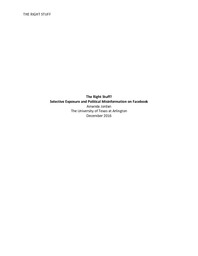| dc.contributor.advisor | Wigley, Shelley L. | |
| dc.creator | Jordan, Amanda | |
| dc.date.accessioned | 2017-02-14T16:17:56Z | |
| dc.date.available | 2017-02-14T16:17:56Z | |
| dc.date.created | 2016-12 | |
| dc.date.issued | 2016-12-20 | |
| dc.date.submitted | December 2016 | |
| dc.identifier.uri | http://hdl.handle.net/10106/26411 | |
| dc.description.abstract | For a democracy to function optimally, its citizens must arrive at election booths armed with factual and complete information. If the voting public is equipped with misinformation, it is just as detrimental as if they are uninformed. Misinformation can be caused and exacerbated by a variety of causes but as online selective exposure increases along with political polarization, the possibility that individuals who gather news on their favorite Facebook platforms will be deceived by political misinformation increases. This false news has the ability to cause more and more voters to formulate beliefs and opinions based on false information. Expanding on the findings that selective exposure leads to political polarization, this paper seeks to understand the effects of partisan selective exposure practiced on social media and an individual’s potential for increased exposure to intentional or accidental political misinformation. | |
| dc.format.mimetype | application/pdf | |
| dc.language.iso | en_US | |
| dc.subject | Social media | |
| dc.subject | Facebook | |
| dc.subject | Selective exposure | |
| dc.subject | 2016 Presidential election | |
| dc.subject | Political news | |
| dc.subject | Political misinformation | |
| dc.subject | Misinformation | |
| dc.title | The Right Stuff? Selective Exposure and Political Misinformation on Facebook | |
| dc.type | Thesis | |
| dc.degree.department | Communication | |
| dc.degree.name | Master of Arts in Communications | |
| dc.date.updated | 2017-02-14T16:17:56Z | |
| thesis.degree.department | Communication | |
| thesis.degree.grantor | The University of Texas at Arlington | |
| thesis.degree.level | Masters | |
| thesis.degree.name | Master of Arts in Communications | |
| dc.type.material | text | |

